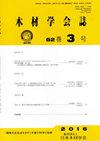Use of Dakekanba Wood for Baseball-bats
IF 0.1
4区 农林科学
Q4 MATERIALS SCIENCE, PAPER & WOOD
引用次数: 0
Abstract
is a pioneer species that has not been used sufficiently in practical applications even though it is the most abundant wood source in the Hokkaido prefecture. We believe that it has potential as a valuable material for use in baseball bats. Assuming that the critical factor for baseball bats is an impact strength, we elucidated the relationships between slope of grain ((cid:9495)(cid:9523)(cid:9483)) and impact strength or impact fracture energy of dakekanba wood by conducting impact bending tests. Results revealed that the Hankinson equation could be used to calculate these relationships to impact strength because they were similar to those considered in previous studies of impact fracture energy. Cylindrical wood specimens such as bat grips were assessed in the impact bending tests, and dakekanba wood was compared with woods used for commercial bats. After impact strength were corrected based on (cid:9495)(cid:9523)(cid:9483) and density, both strength and fracture energy of dakekanba wood were found to be nearly the same as those of commercial wood species for baseball bats. Prototype bats of dakekanba wood were manufactured and experimentally used by a baseball club at Kyoto University. The prototypes were confirmed to have sufficient durability, as no bats broke during their one-week trial use. On a questionnaire survey, players responded with “good” or “normal” regarding bat feeling, flown distance, etc. after hitting with the prototypes. Our study reveals that dakekanba wood has good potential as a baseball-bat material.Dakekanba木在棒球棍上的应用
是一种先锋树种,尽管它是北海道最丰富的木材来源,但尚未在实际应用中得到充分利用。我们相信它有潜力作为一种有价值的材料用于棒球棒。假设棒球棒的关键因素是冲击强度,通过进行冲击弯曲试验,阐明了棒材颗粒坡度((cid:9495)(cid:9523)(cid:9483))与大棒材冲击强度或冲击断裂能之间的关系。结果表明,汉金森方程可以用来计算这些与冲击强度的关系,因为它们与之前研究的冲击断裂能相似。圆柱形木材样品(如蝙蝠握把)在冲击弯曲试验中进行了评估,并将dakekanba木材与用于商业蝙蝠的木材进行了比较。根据(cid:9495)(cid:9523)(cid:9483)和密度对冲击强度进行校正后,发现大坎巴木材的强度和断裂能与商品棒球棒木材的强度和断裂能基本相同。京都大学的一个棒球俱乐部制作了大棒材的原型棒,并进行了实验使用。这些原型被证实具有足够的耐用性,因为在一周的试用中没有蝙蝠损坏。在一份问卷调查中,玩家对击球感觉、飞行距离等的回答是“良好”或“正常”。我们的研究表明,大干坝木作为棒球棒材料具有良好的潜力。
本文章由计算机程序翻译,如有差异,请以英文原文为准。
求助全文
约1分钟内获得全文
求助全文

 求助内容:
求助内容: 应助结果提醒方式:
应助结果提醒方式:


